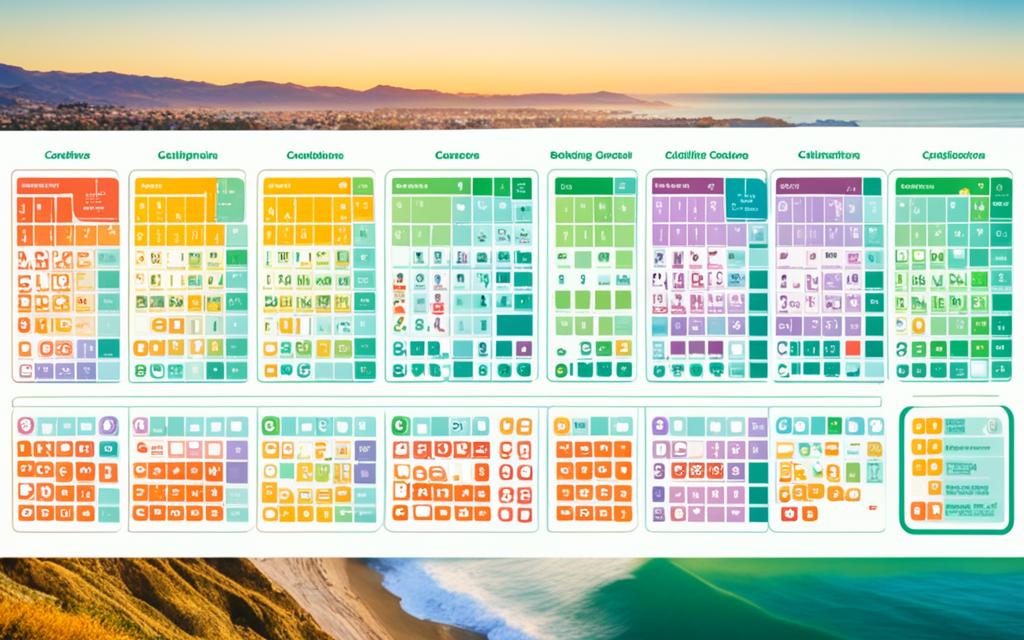Table of Contents
In booking documents and citations, PC stands for California Penal Code1. It helps police figure out which California law someone might have broken. For example, if someone is thought to have trespassed, the booking sheet will mention PC 602. This is the rule in California about trespassing.
Booking is when police write down the arrest details of a person. They note down what the person is accused of. It’s not the same as an arraignment. An arraignment is the first court appearance in a criminal case.
Key Takeaways
- The abbreviation PC in booking documents stands for California Penal Code1.
- Booking is when law enforcement officers record details about an arrest. They include what the individual is suspected of doing.
- Booking and arraignment are not the same. An arraignment is the starting point of a court case.
Understanding California Booking Codes
In California booking documents, it’s key to grasp what different codes mean. These codes shed light on the specific laws people may have broken. The main types include VC (Vehicle Code), PC (Penal Code), and HS (Health and Safety Code).
The VC or Vehicle Code deals with laws about motor vehicles. It covers offenses like drunk driving and speeding. When a document lists a VC code, it means someone might have broken a vehicle law.
Then, there’s the PC or Penal Code. This includes many criminal offenses in California. You’ll see codes for aiding and abetting and resisting arrest, among others. Crimes like murder and robbery also fall under this code, with rates differing by area.
The HS or Health and Safety Code is the third type. It’s about drug laws, including possession and trafficking. An HS code in a document means a suspected violation of these laws.
Booking Code Examples:
| Booking Code | Offense | Occurrence Rates |
|---|---|---|
| VC | Vehicle-related offenses | Varies based on specific violations and geographical locations |
| PC | Criminal offenses | Commonly encountered codes such as aiding and abetting (PC 31) and resisting arrest (PC 148) |
| HS | Drug offenses | Varies based on specific violations and geographical locations |
Offense rates can change based on many factors. For example, prostitution (Penal Code 647(b)) might be more common in big cities like Los Angeles. Elder abuse (Penal Code 368) could be more frequent in areas with many older residents2. Also, failing to control a dangerous animal (Penal Code 399) might happen more in countryside areas2.
Understanding California’s booking codes helps us know more about suspected offenses. This is useful for police, lawyers, and everyone else. It helps them understand crimes’ nature and frequency in the state.
Decoding VC: California Vehicle Code
The California Vehicle Code (CVC) is a set of rules that helps manage cars and their use in California. It covers laws to make driving safer, prevent accidents, and make sure people follow traffic rules.
There are many laws in the CVC about driving and cars. These include:
- Speeding laws: Different roads and areas have specific speed limits to keep everyone safe.
- DUI laws: It’s illegal to drive when you’ve had too much alcohol or drugs. The CVC explains how much alcohol is too much and what happens if you break this law.
- Vehicle registration fraud: You must register your car correctly. Trying to cheat on your registration is against the law.
If you see a CVC law on a ticket, it means the driver broke a specific rule. This makes it easier for police, lawyers, and courts to handle the situation.
Stats show common offenses in the California Vehicle Code. For example, there’s a lot of petty theft, drug-related charges, and drunk driving cases3. These stats also include serious crimes like kidnapping and assault3.
For safe driving in California, knowing and following the CVC laws is key. This helps drivers stay safe and avoid legal problems.
Unraveling PC: California Penal Code
The California Penal Code (CPC) is a key guide to the state’s criminal laws. It covers a wide range of offenses. This means it’s very important for understanding what actions are crimes in California. The CPC lays out the various offenses, sets the punishments, and gives rules for criminal trials.
The CPC includes many laws, like theft, assault, drug crimes, and property crimes. These laws show what behavior is not allowed and how people accused of crimes can be charged. It aims to protect both victims and those accused, making sure the legal process is fair.
If someone is charged under the CPC, it means they’re suspected of breaking a specific law in it. For example, being arrested for theft might lead to a charge of petty theft under Section 484. This is important for figuring out how serious the crime is and what the punishment might be.
Drinking and driving is a big offense under the CPC. California says drivers can’t have a blood alcohol level over 0.08 percent4. There are big penalties for DUI, like fines, losing your driver’s license, and possibly jail. The DMV can take away your license right after you’re arrested for DUI4.
The code also talks about cybercrimes and crimes that involve bad morals. Cybercrime can lead to big fines and long jail times4. Crimes of “moral turpitude” include things like dishonesty or fraud. These can affect your life and career for a long time.
Knowing the main laws in the CPC is crucial. If you’re dealing with criminal charges, you should get a lawyer who knows a lot about the CPC. A good lawyer can help you defend yourself, stand up for your rights, and possibly get a better result in court.
California Penal Code Overview:
| Offense | Statute |
|---|---|
| Theft | Penal Code Section 484 |
| Assault | Penal Code Section 240 |
| Drug Offenses | Penal Code Section 11350 |
| Crimes Against Property | Penal Code Section 459 |
Understanding the CPC is key for everyone in the legal system – whether you’re accused of a crime, a victim, or a lawyer. The CPC lists the rules for criminal acts and ensures justice. Getting advice from a lawyer skilled in CPC matters can really help. They can guide you through the legal system, protect your rights, and work for the best outcome.
Click hereto learn more about the penalties for breaking the CPC4.
Exploring HS: California Health and Safety Code
The California Health and Safety Code (CHSC) is key in managing drug offenses in the state. It looks at different aspects of crimes linked to drugs. Let’s explore some important areas of the CHSC that deal with drug-related laws5.
Drug-Related Offenses in the CHSC
The CHSC covers many drug-related crimes. These range from having drugs, selling them, to having drugs with the intent to sell. When a booking document cites a Health and Safety Code law, it means the person mentioned is suspected of a drug-related crime according to the CHSC5.
Breaking the California Health and Safety Code can lead to tough penalties. These include time in jail, fines, probation, and must-do drug treatment programs. The harshness of these penalties depends on the drug type, how much was found, and if the person has past crimes. It’s vital to know the CHSC’s specific rules about drug crimes to effectively deal with the legal matters.
Legal Definitions and Implications
The CHSC defines “drug” in a wide way. This includes illegal drugs, legal ones like marijuana, prescription medicines, and even over-the-counter drugs that can affect driving. This broad definition makes sure a lot of drug-related crimes are covered, giving the police and prosecutors a strong legal base to fight these crimes.
Unlike with alcohol, California doesn’t have a set “legal limit” for drug use when driving. That’s because drug levels in the blood don’t always match up with how well someone can drive. So, the police use special methods and checks to figure out if someone is driving under the influence of drugs5.
DUID Investigations and Procedures
DUID checks in California usually start with stopping a vehicle. Officers might ask questions and do sobriety tests to see how impaired the driver is. They might also call in Drug Recognition Experts (DREs) who are trained to spot drug impairment. DREs use a 12-step test to check for drugs and how much they affect the driver. Remember, drivers don’t have to answer DRE questions or do sobriety tests unless they’re arrested.
If someone is arrested for DUID, they might have to do a breath test or blood test. If they refuse, their licence could be suspended. Also, the police don’t have to read Miranda rights for a DUID arrest unless they want to ask questions that could lead to self-incrimination.
Punishments and Consequences
Drug-related crimes under the CHSC can lead to various punishments. For DUID in California, misdemeanour penalties are typical unless the situation makes it a felony. Felony DUIDs can result in up to three years in jail. Fines can be from $1,000 to $5,000 if someone is hurt.
| DUID Offense | Punishments |
|---|---|
| Misdemeanor DUID | Up to 6 months in jail, fine up to $1,000 |
| Felony DUID | Up to 3 years in jail, fine up to $1,000 or up to $5,000 if an injury occurs |
It’s crucial for people to know the potential impacts of drug-related crimes in California. They should get legal advice to deal with the complex legal system.
In summary, the CHSC is vital in controlling drug-related crimes in California. Knowing the CHSC’s rules on drug crimes is important for everyone and legal experts. This knowledge helps to understand the possible penalties and effects of drug-related crimes in California5.
The Difference Between Booking and Arraignment
Booking and arraignment are two key steps in criminal law. Each has a unique role in the legal journey. Let’s explore what each process involves and why they’re important.
Booking comes right after an arrest. The police note down important details like the charges and personal information6. This includes taking fingerprints, photos, and listing personal items. At this point, the arrest is officially recorded6.
The next step is arraignment6. This is the accused’s first court appearance. Here, they learn about the charges and are told about their rights6. They also enter a plea and may get bail6.
At arraignment, defendants learn their constitutional rights. These include rights to an attorney, against self-incrimination, and to a speedy trial6. These rights ensure the legal system is fair and just, helping defendants defend themselves.
The rights a defendant has can change based on the charges6. Lesser charges mean fewer rights. This system aims to balance justice with protecting individuals.
To summarise, booking records arrest details, and arraignment is when charges are formally presented6. Knowing these steps helps us understand criminal justice better.
Conclusion
Understanding the meaning behind booking type PC in California is key. It hints at the specific crime a person might be accused of. The codes VC, PC, and HS stand for different legal areas: California Vehicle Code, Penal Code, and Health and Safety Code. Each one relates to distinct laws and violations7. Being familiar with these terms helps people move through the legal system more smoothly.
Booking is when someone’s arrest details are recorded. Arraignment, on the other hand, is the first time they go to court for the crime. These two are different steps in the criminal justice system7. Knowing what each process involves helps people understand their rights and what to expect.
It can be tough to figure out what booking documents are saying, especially if you’re not used to the legal jargon. But, with the insights from this article, you’ll be better prepared to deal with the system and make smart choices7. Knowing what the different booking types and codes mean is really useful in legal situations.
So, learning about booking type PC and related codes in California documents is very empowering. It lets people understand what charges they face and what the legal journey ahead looks like7. This knowledge is crucial for making well-informed decisions and ensuring your rights are safeguarded as you navigate through the legal system.
FAQ
What does booking type PC mean?
Booking type PC stands for the California Penal Code. It’s what police use in booking papers. This helps them show which California law someone might have broken. For example, if someone is thought to have trespassed, they’ll use PC 602. That’s the code for trespassing in California.
What do the codes VC, PC, and HS mean in booking documents?
In booking papers from California, VC, PC, and HS have special meanings. VC refers to the Vehicle Code, PC is the Penal Code, and HS means the Health and Safety Code. These codes point out the exact law someone is accused of ignoring. For VC, it could be a traffic-related offense, for instance.
What laws are covered under the California Vehicle Code?
The California Vehicle Code (CVC) deals with all things car-related. It includes rules for driving too fast, drinking and driving, and faking car registration.
What offenses are charged under the California Penal Code?
Most crimes in the state are covered by the California Penal Code (CPC). It includes serious crimes like breaking into homes, sexual assault, and having illegal weapons.
What laws are included in the California Health and Safety Code?
The California Health and Safety Code (CHSC) focuses on issues with drugs. It covers carrying marijuana illegally, selling drugs, and having drugs to sell.
What is the difference between booking and arraignment?
Booking is when police note down everything about someone’s arrest. It lists the suspected charges. Arraignment is different. It’s a court’s first step in a crime case. Here, the person hears the charges, gets told their rights, makes a plea, and might get bail set.
Source Links
- https://partner.booking.com/en-gb/help/account-and-login/settings/logging-your-bookingcom-extranet – Logging in for accommodation partners platform – extranet
- https://www.shouselaw.com/ca/defense/penal-code/ – California Penal Code – A Legal Guide to Each Section
- http://jaireports.co.la.ca.us/jairpts/jaichrg.html – CHARGE LIST
- https://www.chamberslawfirmca.com/category/criminal-defense/ – Criminal Defense Archives – Chambers Law Firm
- https://www.shouselaw.com/ca/dui/laws/duid/ – DUID – Driving Under the Influence of Drugs in California
- https://www.shouselaw.com/ca/blog/what-do-vc-pc-and-hs-mean-in-california-booking-documents/ – What do VC, PC, and HS Mean in California Booking Documents?
- https://www.courts.ca.gov/cms/rules/index.cfm?title=four&linkid=rule4_130 – California Rules of Court: Title Four Rules








